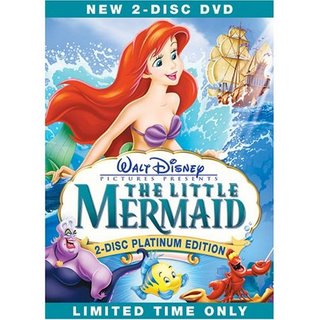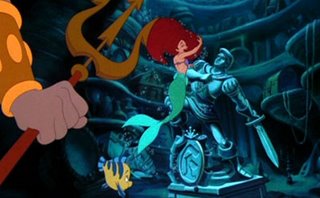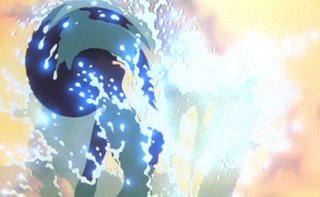A bit of a diversion for today as I hand the reins over to one Mr Dust of world renowned PinkieDust blog site. A while back, Pinkie sent me a copy of The Little Mermaid on Broadway and we became online friends through our shared love of Disney, a rather smutty sense of humour and similar tastes in music. I was planning to do my own Little Mermaid post, but when Mr Dust sent me this, I knew I couldn't top it. Not only is the writing great, it reveals a lot about the struggles some people have to go through when they make certain choices in life to be themselves. I think the author of this piece is one courageous young man and Dazpants and I will be there to cheer him on at any important occassions from now on... i'm proud he let me publish this on my blog...
 "When I was eight my father returned from a business trip with The Little Mermaid for one of my sisters, the story wrapped around my body. When I started to recall the lines of Under The Sea and Part Of Your World my father prohibited me from ever watching it again. I was reduced to stealing the soundtrack from Our Price and listening to it under the sheets each bed-time whilst gripping another stolen item from the Disney bandwagon; my sisters doll of Ariel's older sister Arista. There was something telling, homosexual, abject and horrific in Ariel's story that I, as did my homophobic father, knew said something about difference and liberty.... .
"When I was eight my father returned from a business trip with The Little Mermaid for one of my sisters, the story wrapped around my body. When I started to recall the lines of Under The Sea and Part Of Your World my father prohibited me from ever watching it again. I was reduced to stealing the soundtrack from Our Price and listening to it under the sheets each bed-time whilst gripping another stolen item from the Disney bandwagon; my sisters doll of Ariel's older sister Arista. There was something telling, homosexual, abject and horrific in Ariel's story that I, as did my homophobic father, knew said something about difference and liberty.... .
Hans Christian Andersen's story 'The Little Mermaid' must be read as a creation of myth and a metaphor for the woman's subjectivity within a heterosexualist patriarchy. The myth is about a construction of such subjectivity through a sequence of divisions or splits: (1) birth, (2) growing up, (3) desire and (4) death.
Some have argued that the Disney adaptation simplified the symbolic status of the ideological traits of the original. To be sure, the internalisation we see as a vital part of the subject's life in the original is somehow externalised. Suddenly we see Disney reducing the myth to a fairy tale. This is a cop out. The Little Mermaid is about female subjectivity and the Disney reproduction unties the death of the original through the happy ending. This is not so.
Firstly, Ariel is a princess, a prostitute to her father's pleasures and showgirl. The audience follows her, as she is unable to speak the same language as her sisters. In this, Ariel is robbed of her voice under the sea even before she hands it over to the sea-witch. She refuses to sing and to play the role that her system demands. Her friends are similar misfits: a shaggy dog, a flounder and a bird. But this is where the Disney adaptation evolves from a narrative of female subjectivity into gay marginalisation.
How so? Well the answer is in the assumption asserted by those who argue Disney copped out and gave the audience a happy ending. Essentially, was this a “and they lived happily ever after” conclusion that we see in Cinderella, Snow White and Sleeping Beauty? For sure, we see the wedding of Prince Eric and Ariel, which did not happen in the Danish original. For me the original can be decoded as the abject plight female subjectivity but the Disney adaptation delves deep into the accord of growing up as a gay outsider.
The (my) family demands a critical decision: heterosexuality or leave. Ariel is also forced to make that choice. She is not part of the world thrust upon her just as the gay son knows that the norms presented by his family do not reflect his desires. Ariel is ripped from one world and enters another. Ursula/Vanessa get in the way for bit but Disney ensures the lass gets her boy in the end.
The end scene or rather conclusion might refuse a death as was in the original but rather offers something just as horrific and is instrumental as to way the The Little Mermaid: the Disney Adaptation calls out to a many gay boy, teenager and adult. The original ending satisfies female subjectivity with its finality. The death is viola, go home, death ends it all, it's over, she's dead, it's done. Ta-dah. She doesn’t get anything, nada, zilch. Sad but true…
The cartoon on the other hand sees the infamous wedding. It's argued to be a fairy tale ending. Titan, her father and maybe some of her sisters pop out of their surface to watch the wedding and start to chime in when the key aria of the production arrives for the finale. Happy ending this is not. Ariel cannot have her family and the delights of living under the sea whilst simultaneously enjoying the pleasures of the human world. It is either or and nothing less.

Ariel comes out as being human and the Part of Your World ballad is a girl singing in the closet symbolised by living under the sea. The sea of course acts as grand metaphor for Ariel’s repression and the aria Part Of The World is primarily about her desire for a forbidden object: a human being. When her father discovers her lurid desires in her secret grotto Titan goes into some manic shock and destroys all the material products that symbolises the parents disgust and his child's pleasure. Naturally this echoes the items that suggest the son's sexuality that are often hidden under the bed such as a gay porn magazine which are ritualistically burnt. We, as the gay audience, instantly identify with Ariel and understand her desire and her pull to get out of the world that refuses to acknowledge herself and her desire.
When Ursula transforms the mermaid into a human there are a horrendous few seconds when this human begins to drown. This is coded as the current world of below literally killing the insides of Ariel and now it is only her friends who pull her up to the surface. The cartoonists ensure she breaks through the surface as if she is smashing open a cage that she’s been trapped inside for eternity. The ecstatic thrust into the air with the red hair flown aside and her breasts inflated to the sky. Pure jouisance.
From then on, Ariel has come out of the sea and completely out of the closet. In-between there is some little drama caused by the sea-witch but in true Disney style the baddie gets forked. But this doesn’t actually equate to the happy ending that we see in so many fairy tales but it still a conclusion that resonates with me.
Since coming out last year my family have cut all ties including forcing me to change my surname. I am not a part of their world nor are they in mine. Days of personal achievement such as the university graduation are done in solitude. When my name was read out and I spoke to the chancellor I pretended that they were up in rafters cheering me on in the audience with the other families. This is not to mention the birthdays alone and the Christmas cards that I’ve since sent to myself.
Despite this, I am out. Away from the iron fist. The secrets, the hiding and the shame are all in the past. The weight is completely gone. The sickness of guilt that riddled my early and teenage years is no longer the little bitch that kept me up all night. Yet for this path I had to leave another. Yes I’m cruising into the sunset much like that of Ariel and Eric's wedding boat but it has come with an awful sacrifice that I live with every day.
I see Ariel too living the exactly the same existence. She cannot have both worlds for they collide and she’ll surely die of drowning. She has been barred from her old world. When I was eight I knew that I was gay and I knew that Ariel’s story was somehow hinting towards the incompatibility of positions, decisions and lives. Her worlds are divided and irreconcilable as one refuses to tolerate the other. Such is the force of the heteronormative design of Ariel's father, her lover is refused acceptance even when he saves the day. We know this because Titan, her father, changes his daughter into another human being but not Eric into a merman. Logically speaking if Titan had changed Eric he’d have his daughter with him, she’d have Eric and all would be appeased. Thus in this, we see Titans intolerance of Ariel's desire is absolutely realised. He’d prefer to banish daughter than permit Eric entrance into his kingdom.
So this is why the adaptation is one of subjectivity but of gay subjectivity. Yes she doesn’t die but she lives a life where her whole childhood is banished. Her teenage world remains lost and down the drains. There is nothing that lives and breathes for Ariel under the sea now except for memories. She has a future but it is split and ripped out of her previous life as a mermaid. This motion correlates with my life as a gay boy gaining freedom and life through leaving a most loving world for another. It's not for nothing that Ariel and her love drift off into a very gay looking rainbow at the end.
This is no happy ending but one that tells the 8 year old gay boy living in a strict Catholic family that uniformity can go fuck itself, that I’m not alone in wanting something different no matter how out-worldly that might seem at that time and that “people” do make it when they kick out and resist. This reveals the true blissful conclusion in this version of the Little Mermaid. Not that girl lives nor that she gets the man and the bitch is dead but that she doesn’t give in to the surrounding authoritarianism and universalism. She imprints her desire, she follows her desire and she embraces her difference. She takes pride in her self, even when her father attempts to destroy it. She accepts a life disconnected from one world and bravely takes a step into another.

For me Ariel comes out of the sea and out of her closet. Yes she can't have both worlds but she has the strength to actually go against the tide and lives on. She does all of this and survives. She's a gay icon for me at the age of eight, 15, 18 and 23."
MP3 LINKS:
ALBUM: The Little Mermaid Broadway Demos
MP3: Jessica Simpson - Part Of Your World
MP3: The Jonas Brothers - Poor Unfortunate Souls
MP3: Raven Symone - Under The Sea
MP3: Ashley Tisdale - Kiss The Girl
OTHER LINKS
MP3: Buy The Little Mermaid 2 Disc DVD
LINK: Buy The Little Mermaid I&II DVD Box Set
LINK: Buy The Little Mermaid Soundtrack
LINK: The Little Mermaid III Sneak Peak Trailer
LINK: Info on The Little Mermaid Broadway Musical
*********************************************
Posted by Paul 3:01 PM
3 Comments:
-
- Paul said...
7:50 PMlinks will be fixed soon!- Robpop said...
6:20 PMpinkie you do realise the writer of the Lil Mishmash was a bumboy?- emma said...
4:14 AMperhaps the little mermaid is quite a reflection on the story of many gay men, due to the fact that it was produced and the lyrics written by a gay man, Howard Ashman, who apparently was not accepted by his family and was continually looking to prove himself to his mother (thus the cut song from aladdin 'Proud of your boy')... the sister Alana, is a reference to Alan Menken, so perhaps the under sea world is symbology for Ashmans Showbiz (the forbidden human world), one of the fish also looks like John Waters with a similar moustache, and Ursula was created, referencing Divine.
